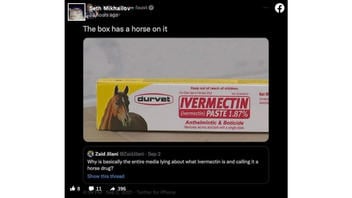
Does the use of ivermectin as a dewormer for horses mean it is only a veterinary medicine? No, that's not true: There are ivermectin doses for 1,000-pound animals and different doses and forms to treat rosacea and parasites in humans. But, while the active ingredient is the same, the veterinary formulation is not the same as the human product, and manufacturer Merck says there is no scientific support for its use in treating COVID-19. Federal poison control officials report an increase in ivermectin calls to poison control hotlines in 2021, associated with the rumor that it is a miracle cure, and warn self-dosing with feed-store ivermectin is dangerous.
The claim that it's only horse medicine was implied in a Facebook post (archived here) on September 5, 2021, that mocks conspiracists who claim ivermectin's benefits are being suppressed. The taunting post is built on a screenshot of a tweet that asked, "Why is basically the entire media lying about what Ivermectin is and calling it a horse drug?" The post has a photo of an ivermectin paste for horses and a response that reads:
The box has a horse on it
This is what the post looked like on Facebook at the time of writing:
(Source: Facebook screenshot taken on Mon Sep 6 14:13:08 2021 UTC)
The post might well leave social media users with the impression that ivermectin is only for animals, specifically horses. That's not true. There are ivermectin products for both animals and people, though they differ in important respects.
According to the Food and Drug Administration (FDA):
Ivermectin tablets are approved by the FDA to treat people with intestinal strongyloidiasis and onchocerciasis, two conditions caused by parasitic worms. In addition, some topical forms of ivermectin are approved to treat external parasites like head lice and for skin conditions such as rosacea.
Some forms of animal ivermectin are approved to prevent heartworm disease and treat certain internal and external parasites. It's important to note that these products are different from the ones for people, and safe only when used in animals as prescribed.
Animal ivermectin products are different than those intended for people in at least two ways:
- The animal drugs are highly concentrated because they are intended for large creatures, like a horse or a cow, that weigh roughly 1,000 pounds, compared to the average human's weight, which is less than 200 pounds.
- The inactive ingredients in the animal products aren't evaluated for use in people, which means that doctors don't know how the human body will respond.
Taking medications meant for animals is not OK, according to the FDA, which has received multiple reports of patients requiring medical attention, including hospitalization, after taking ivermectin intended for livestock. On August, 21, 2021, the agency tweeted:
You are not a horse. You are not a cow. Seriously, y'all. Stop it. https://t.co/TWb75xYEY4
-- U.S. FDA (@US_FDA) August 21, 2021
The FDA was responding to the persistent rumor that ivermectin can be used to prevent or treat COVID-19. Although clinical trials are underway, current data do not show that ivermectin is effective against the virus, and taking large doses of the drug can be dangerous. According to the FDA, ivermectin can cause nausea, vomiting, diarrhea, dizziness, seizures, coma and even death.
Merck, which did not make a successful COVID-19 vaccine and could profit if its product were therapeutic, flatly refutes claims that ivermectin is effective against COVID-19:
In an August 23, 2021, email to Lead Stories, a Merck spokesperson wrote:
... our analysis has identified:
- No scientific basis for a potential therapeutic effect against COVID-19 from pre-clinical studies;
- Significant limitations in evidence for clinical activity or clinical efficacy in patients with COVID-19 disease, rendering existing data inconclusive, and;
- A lack of safety data in the majority of studies.
The spokesperson for Merck pointed out that major public health organizations around the world have concluded the same.


















